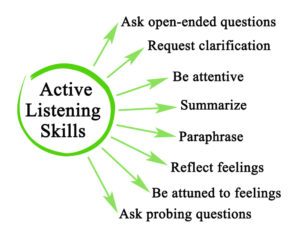“If you don’t ask, you don’t get” – We’ve all heard that saying in one form or another at some point in our lives. But this statement also applies to the field of selling.
The best salespeople are able to make more sales because they understand the importance of asking the right sales questions to uncover needs. If you ask the right questions you make more sales.
Want more answers? Ask more questions!
You cannot sell without having the right information about your prospect and their needs, and you can’t get the right information without asking the right questions.
Most salespeople fall into the trap of talking too much. There is a reason why people in sales are often thought to have the “gift of the gab”, and it’s because they are considered to be good talkers. When most people think about salespeople they think of people that are able to think fast, talk faster, and persuade people into buying something they don’t want or need. And maybe that holds true…..for amateur salespeople. Professional salespeople on the other hand are different.
A sales professional doesn’t place too much emphasis on talking over their prospects and pitching in order to make a sale – instead, they place more emphasis on asking their prospects engaging sales questions and listening to their answers.
They take a more consultative approach to selling and they understand that the key to being able to do this is having the right information which is obtained by asking the right questions to their prospect.
The benefits of asking the right sales questions
- By asking the right sales questions you demonstrate to your prospect that you are interested in them rather than only being interested in making a sale. This creates trust, strengthens rapport, and enables the prospect to open up more.
- You will find out what really matters to them, uncover their needs, and find out what pain points and problems they would like to solve.
- Asking the right sales questions gives you control over the sales process/interview/meeting
- It gives you momentum and keeps the conversation flowing in a natural and unforced manner
- The right questions will trigger emotions, which are an important element of making a sale
8 principles for asking the right questions
There are some key principles to keep in mind that will assist you in asking the right questions.
1. Have a clear outcome in mind for each question you ask
For each question you ask you should have a clear outcome or objective for asking that question. What specific information are you hoping to get from asking this question? Keeping this in mind will help you to avoid asking random questions or going off-topic.
2. Show interest and curiosity
When you are asking questions you are on a fact-finding mission. You want to uncover as much information as possible about the prospect and their needs.
You need to be genuinely curious to gather as much information as possible. This will help you to ask the right questions and probe for further details where necessary. Demonstrating a genuine interest in your prospects shows that you care, and as a result, they will open up more to you, enabling you to get even more information.
3. Use a mix of open and closed questions
 Open questions typically start with Who, What, Why, Where, When, and How.
Open questions typically start with Who, What, Why, Where, When, and How.
These sort of open questions enable you to elicit much more information from your prospects and allows them to respond with more detailed answers.
Closed questions are questions that elicit a Yes / No answer. You should use closed questions in order to gain clarification or agreement.
4. Ask questions that uncover their needs
Questions that uncover your prospect’s needs should be clear and easy to understand. Some examples are:
- What are your goals?
- What are your main priorities?
- What is going to make the difference for you / your business?
- What is working / not working for you right now?
5. Ask questions that uncover their buying motivation
A prospect’s buying motivation is not always the same as their needs. Their buying motivation is the reason they want to buy/are considering buying from you, and these reasons are more emotional and intangible. They are based on feelings and desires.
Uncover their true motivation for buying and you will have found a “hot button”, which when pressed, will make your prospect more likely to buy from you.
Find out what their underlying buying motivations are by asking questions that elicit a more thoughtful and emotional response:
- What products/services have you tried in the past?
- What does solving this problem mean to you?
- Why is it important to resolve this issue?
- How will solving this problem make you feel?
- What will happen if this issue is not resolved?
6. Do NOT ask questions that will offend them!
I’ve seen and heard many salespeople ask questions that have made me cringe and turned me right off them on the spot.
If you offend your prospect then you might as well just end the meeting and get up and leave right then, because you will have given them the only reason they need for not buying from you – disliking you.
“People buy from people they like”
This saying is so true it should be hung on the walls of every sales office. People buy from people they like. If your prospect doesn’t like you, they will not buy from you. If you offend your prospect they may also refuse to deal with you and opt to do business with another sales rep in your company (ouch!).
Of course, there may be some exceptions to this, such as if you are selling a rare product, or there are no alternatives in the marketplace, but for the most part, the majority of salespeople are selling products to which there are alternative options available. Don’t lose the sale by offending your prospects with overly personal questions or badly phrased questions.
7. Be natural when you ask your questions
Having a list of questions is not a problem, and is something I recommend you do when you go into any sales meeting. The problem arises when you spend more time looking at your notepad than you do paying attention to your prospect.
Try and give more attention to your prospect, make eye contact, and be natural with your questioning and communication. Your prospect will feel more valued and important when you give them your undivided attention, and you will get better answers as a result.
8. Listen to your prospects and don’t interrupt
Once you have asked your question it’s important to listen attentively.
 Let your prospect respond freely and don’t interrupt them. When you interrupt them you interrupt their train of thought and this can lead be you missing out on vital information.
Let your prospect respond freely and don’t interrupt them. When you interrupt them you interrupt their train of thought and this can lead be you missing out on vital information.
Listening is an important skill and one that every salesperson should practice in order to improve their overall communication skills.
Active listening involves summarising and paraphrasing important things your prospect may have said back to them. This demonstrates that you have understood them, and also gives you an opportunity to check for understanding and clarity.
Listening attentively also enables you to pick up on key points and ask further probing questions to get them to dig deeper and elaborate on what they have said.
This all leads to more valuable insights and information for you.
The key areas of questioning
You should focus your questioning around these key areas:
1. Your prospect’s needs and wants
Ask sales questions to uncover your prospect’s needs and wants. Understanding the difference between these two is important.
Needs: These are things your prospect has to have and something they cannot do without.
Wants: These are things your prospect would like to have, which have an emotional pull but isn’t essential to their basic survival.
Needs are specific to the business or individual, whereas wants are purely emotional.
“People generally buy what they want, they don’t always buy what they need”
Here are some examples of questions you should ask:
- Who are the other decision makers in the business?
- What are the key challenges you are facing right now?
- What is your goal for the business?
- What other solutions have you tried?
- How satisfied are you with your current supplier?
- What would happen if this problem is not resolved?
- How important is it to you to solve this problem?
- What would be the benefits of getting this problem resolved?
2. Selection and buying criteria
It’s important for you to know how your prospect will be making their buying decision. Armed with this information you will be able to better position yourself as a viable option and fend off any competition to the sale.
Some example questions are:
- What do you really value in a salesperson / your relationship with your supplier?
- What is your budget for this project?
- How do you decide whom to do business with?
- What are the 3 main things you want and expect from your supplier/this business relationship?
3. Your product or service
Ask your prospect probing questions about what they understand or think about your product or service. This will help you to gauge their understanding of your product and to also identify anything they may have misunderstood which gives you a chance to clarify.
Some example questions include:
- What are your expectations of this product/service?
- What further information do you need?
- Have you seen anything similar on the market?
- What do you like / not like about what you’ve seen so far?
- How does this product/service compare with your current supplier or other options you are considering?
4. Other options your prospect is considering
You want to ask your prospects about what their current options are. If your product is just one of three potential options they are evaluating then you want to know that.
It’s important to know who your competition is with for the sale. This helps to better yourself against your competitors and sell against their weaknesses. It also helps from a forecasting and time management perspective. As a salesperson how you use your time is important, so you want to be able to prioritise certain prospects over others.
If you’re competing for a sale with 10 other competitors, versus competing for another sale with only 2 competitors it’s important to know that so that you can allocate the right amount of time and energy to each prospect accordingly.
Some example questions include:
- How many other people are you talking to?
- What other options are you considering?
- Who else have you been speaking to regarding this decision?
- Who are we up against?
5. The decision-making process
You want to know what sort of process your prospect will go through to make the final buying decision. Do they want another meeting? Are they expecting a written proposal or brief? Knowing your prospect’s process will help you prepare for the next phase of the sales cycle.
Some example questions include:
- What can you tell me about your decision-making process?
- Who is the key decision maker / who are the key decision makers?
- In what way can we support you in this process?
- What timescale have you got in mind for making a decision?
Furthering the relationship
Once you have a customer on board it’s important to maintain and further that relationship. Don’t just stop with the initial sale. You’ve worked hard to get that customer so make the most of the relationship. Remember:
“An existing customer is a great source of two things: more business and more customers”
Ask questions that will strengthen your relationship with them, and which will ultimately lead to more business. You want to sell more to existing customers, ideally increasing how frequently they buy from you (Average Order Frequency), and how much they spend per order (Average Order Value).
You also want to increase the number of referrals you get from each customer. Existing customers are the best source of referrals as they can vouch for the quality of service and experience you have delivered.
Some example questions include:
- What other areas of the business could benefit from a similar solution?
- What are the other issues you are facing in the business or expect to face in the near future?
- What other opportunities are there within the business?
- Who else do you know that would benefit from this product/service?
Summary
Asking the right sales questions is the key to making more sales.
It’s important to ask sales questions that uncover needs and wants, find out your prospect’s buying motivations, and understand who you are competing against. When you ask questions, be sure to listen with attention so that you may follow up on your prospect’s answer with further probing questions.
Use open questions to elicit as much information as possible, and use closed questions to check for clarification and gain agreement.
It’s important to show interest in your prospect and ask your questions with a genuine sense of curiosity so that you can establish trust, likeability, and a deeper rapport with them. People buy from people they like, so don’t ask the wrong questions and get on the wrong side of your prospect!
Professional salespeople think of themselves as consultants, and they spend time learning the psychology of selling.
You should always be thinking of how you can serve your customers better. Understanding them better is the key to doing this, and asking the right questions will equip you with the information you need.




